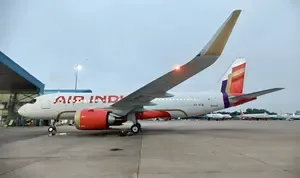What Led to Six Aircraft Engine Shutdowns and Three Mayday Calls This Year?

Synopsis
Key Takeaways
- Six aircraft engine shutdowns reported this year.
- Three Mayday calls have been documented.
- Air India flight AI 171 was involved in a tragic crash.
- The DGCA flagged 51 safety violations at Air India.
- Investigations are ongoing to determine causes of incidents.
New Delhi, Aug 5 (NationPress) This year has seen a total of six incidents of aircraft engine shutdown and three Mayday calls, as reported by the civil aviation ministry. IndiGo and SpiceJet each faced two engine shutdown events, while Air India and Alliance Air recorded one each, according to information provided by Minister of State for Civil Aviation Murlidhar Mohol to the Rajya Sabha.
Among the three Mayday calls, one involved an Air India flight (AI 171), which tragically crashed into a building shortly after taking off from Ahmedabad on June 12. Both IndiGo and Air India Express logged one Mayday call each.
A Mayday call serves as a critical distress signal, predominantly utilized in aviation and maritime crises. A pilot repeats Mayday three times to alert ground control that the aircraft is facing a life-threatening scenario and requires immediate assistance. "From January to July 2025, a total of six engine shutdown incidents and three Mayday calls have been documented," Mohol stated in a written reply to the Rajya Sabha.
In a separate written response, the minister indicated that the preliminary report by the Aircraft Accident Investigation Bureau (AAIB), released based on available data on July 12, does not reach any conclusion regarding the Air India plane crash, which remains under investigation.
When questioned about a potential investigation into sabotage concerning the crash, the Minister asserted, "Every angle is being examined to establish the potential causes or contributing factors behind the accident."
On July 30, 2025, the Directorate General of Civil Aviation (DGCA) highlighted 51 safety violations at Air India during its annual review. These encompassed outdated training manuals, incomplete pilot training, unqualified simulators, and discrepancies in low-visibility operation approvals.
Among these violations, seven were categorized as critical Level I breaches, which the airline was directed to resolve by July 30. The remaining 44 non-compliances must be addressed by August 23.
This action by the DGCA followed recent enforcement steps, including grounding an Air India aircraft that had not undergone a timely inspection of its emergency slide—a vital safety component.









